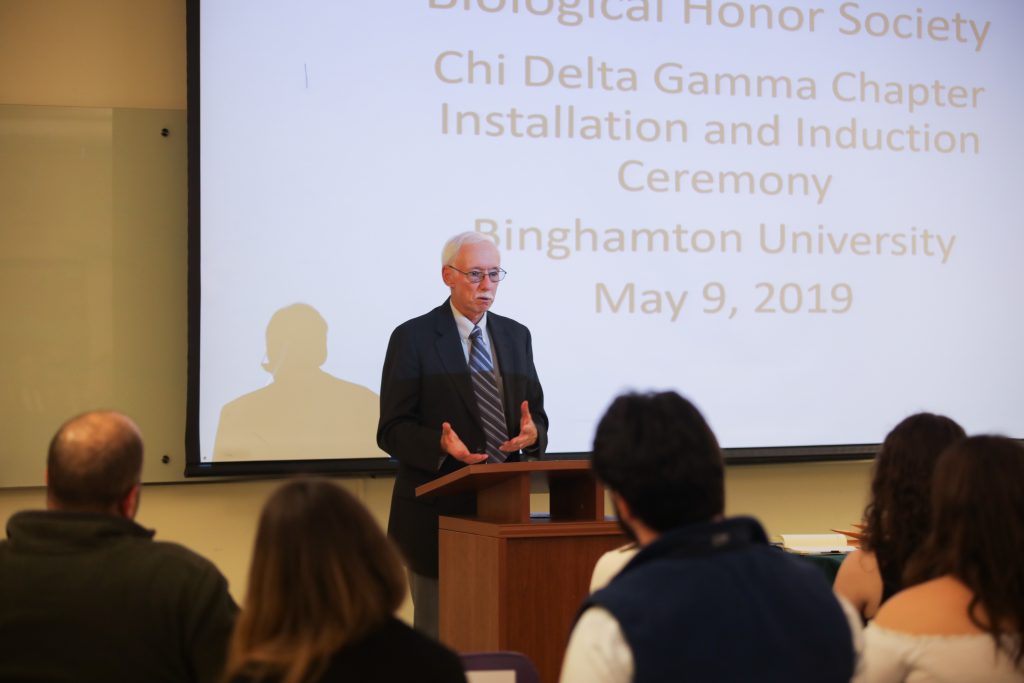
On Thursday night, 65 undergraduate students at Binghamton University were inducted into the new campus chapter of Beta Beta Beta (TriBeta), a national honor society for biological sciences.
Spurred by student interest in TriBeta’s research-oriented agenda, the new chapter was formed through the combined efforts of students and faculty within the University’s biology department. Mio Ito, vice president of BU’s chapter of TriBeta and a sophomore majoring in biology, said the new chapter was created because there was a need for a more research-focused student organization.
“We wanted a club that was more research-focused, because there are a lot of science clubs across campus, but a lot of them are more pre-med,” Ito said.
According to Talia Cheifetz, president of BU’s chapter of TriBeta and a sophomore majoring in biology, the new chapter will help students at BU network and gain greater employment opportunities.
“By having our own chapter at Binghamton, this will allow BU students to network with students and faculty throughout the country at national TriBeta conventions,” Cheifetz wrote in an email. “Additionally, a strong alumni network can be established over the years. This will aid students in securing internships and independent research opportunities that otherwise may not be easily accessible.”
The induction ceremony featured talks from both Steven Tammariello, keynote speaker for the event and an associate professor of biology at BU, and Dave Royer, a district director for TriBeta.
Tammariello kicked off the ceremony by discussing the importance of diversity for future ideas and research.
“What I would hope for this group of people is that you’re diverse enough, so at your meetings you can come up with different things to talk about,” Tammariello said. “It shouldn’t just be pre-med. It shouldn’t just be ecology. It should be everything. Because as you move on in life, you’re going to find that the more broad training you have, the better you’re going to be at thinking and at designing experiments.”
According to Royer, TriBeta is an organization specifically geared toward helping aid students in their pursuit of knowledge.
“The TriBeta [honor] society is for students, particularly undergraduates, dedicated to improving the understanding and appreciation of biological study and extending the boundaries of human knowledge through scientific research,” Royer said.
According to Cheifetz, the group already has multiple events planned for this upcoming fall as the organization aims to root itself on campus and establish a connection with other chapters across the United States.
“The organization will establish professional events, such as graduate panel speakers, [group-study] sessions, service projects and scientific writing workshops, as well as more recreational [and] fundraising activities such as bake sales, bio-themed pancake breakfasts and ice cream socials,” Cheifetz wrote. “More than anything, we want to foster an active community of biologists and biology-interested folks who are able and willing to make a difference.”
To join the society as a full member, a BU student must acquire at least a 3.0 GPA after taking 12 credits of biology classes at BU, and to join as an associate member, a student would need a 2.8 GPA and 10 credits from biology classes at BU.
TriBeta at BU is also open to graduate students, as well as BU alumni who wish to become honorary members through the University.
Before the undergraduates signed their names in the official TriBeta members’ book, Tammariello advised the inductees to utilize the organization to expand their knowledge and opportunities.
“Take this opportunity of having this great organization here, and use it in order to broaden your knowledge base, to broaden your horizons and to become as good as you can in biomedical sciences, biological sciences or whatever you do,” he said.


